



















Jules Loveland, Editor
You might have heard the expression ‘culture eats strategy for breakfast’ when talking about organisational success. It’s interesting then, that it’s more common for organisations to give time to strategy not culture.
Culture is the soil from which everything in our organisation grows, and if we don’t pay attention to our culture we risk growing things we never intended. Things that could cause harm to anyone who interacts with us.
This issue of Together will equip you to understand how healthy cultures can make places safer. We’ll explore themes such as how to form a culture of goodness (pg 7), creating space for reflection and lament (pg 10) and how healthy cultures can be maintained across multiple contexts (pg 15). Also in this edition, we introduce you to Gilo who offers insights on creating safe cultures for victims and survivors (pg 16), and we’ll look at some helpful and
practical tools to help you establish and maintain the culture you want (pg 19).
We want to thank you again for helping to create safer places. Your membership with us means that we can continue to work towards a world where every child and adult can feel, and be, safe.

As the UK’s leading independent Christian safeguarding charity, we have always sought to create places where children and adults can be free from harm and abuse. Now we have a new government in place, we are renewing our call for key legislative changes that will help make society safer. Our manifesto, entitled ‘Together we can – a manifesto for a safer society for all’, released earlier this year, contains several key legislative recommendations, grouped into three main themes.
1. Strengthen the safeguards that are already in place.
2. Better protect victims and survivors of abuse.
3. Create safer environments for all.
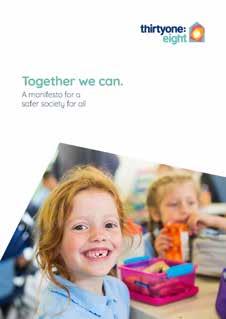
With the legal responsibility for safeguarding split between the UK government and the devolved administrations of Scotland, Northern Ireland and Wales, the manifesto is divided into four specific policy asks for the four UK nations.
Already we are seeing encouraging progress on some of the issues we’re raising. For example, our recommendations were read in the Judicial Review repealing Section 12 of the Justice (Sexual Offences and Trafficking Victims) Act (Northern Ireland) 2022. The Review was delivered by Justice Humphreys, who declared that Sections 12-16 of the Act are incompatible with Article 10 of the European Convention on Human Rights (ECHR). Also, in collaboration with other organisations, we have seen traction on the issues of mandatory reporting and closing the sex offender loophole.
Change is happening, but there is so much more to do.
Together we can make a difference. We invite you, our members, to engage with the issues in the manifesto, and encourage you to share it with your networks.
You may even wish to speak to your local MP. thirtyoneeight.org/manifesto

Earlier this year Professor Alexis Jay CBE released her report on the Future of Church Safeguarding in the Church of England.
This report follows the conclusion of the Future of Church Safeguarding Programme, aimed at ensuring fully independent safeguarding within the Church. Professor Jay’s findings highlight that the Church’s safeguarding efforts fall short of standards set by secular organisations, noting inconsistencies in guidance, poor data collection, inequity in funding, and a lack of a uniform complaints system.
The report offers 13 recommendations, including the creation of two independent bodies:
• Organisation A: Responsible for all operational Church safeguarding activities.
• Organisation B: Responsible for oversight and scrutiny of safeguarding.
Both organisations would operate as registered charities, receiving funding from the Church and bound by legally binding collaboration agreements.
As the UK’s leading independent Christian safeguarding charity, we are pleased that this work has been undertaken. Whilst we do not necessarily agree with all the detailed recommendations, the report has highlighted again how the Church of England has fallen short in its safeguarding responsibilities and has failed victims and survivors of abuse on too many occasions.
We released a statement earlier this year urging the Church of England to consider the report thoroughly ensuring victims’ involvement in implementing recommendations and seeking external expertise. We raised the following issues:
We encourage greater emphasis that scrutiny and accountability should be paired with support. Justin Humphreys, Joint-CEO, states, "Identifying what is not working isn’t enough; there needs to be wisdom and support in rectifying any areas that are inadequate or unsafe."
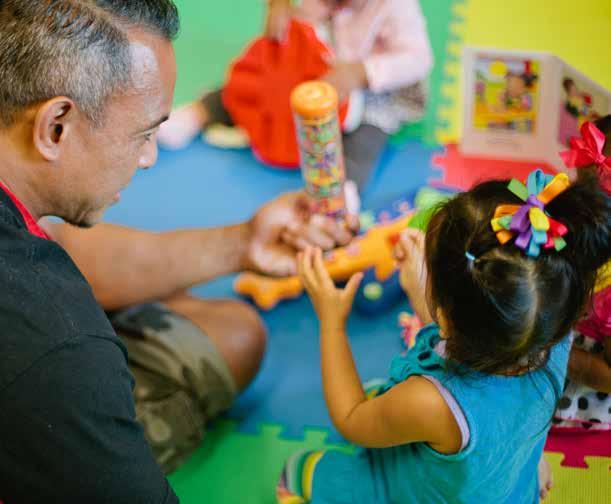
We have concerns about removing operational safeguarding from the Church, fearing it may lead to a belief that safeguarding is no longer the Church’s responsibility. This could weaken efforts to foster safe, healthy church cultures.
The Church’s complex structure presents significant challenges for operational safeguarding. Resistance to safeguarding policies is noted, with some viewing it as a hindrance to ministerial duties. Clarity is needed on how an external body would address these internal issues.
Creating an external body that understands the Church’s structure and culture while being expert in safeguarding is time-consuming. Delays in effective safeguarding practices risk re-traumatising those already harmed.
The dismantling of the Independent Safeguarding Board has delayed case reviews for victims and survivors. Clarity is needed on whether these reviews will fall under Organisation A or B.
The report suggests using guidance related to emotional and psychological abuse rather than spiritual abuse, which is hugely disappointing. Spiritual abuse is distinct due to its religious context and misuse of spiritual authority. Removing this context undermines the reality of this type of abuse and its unique impact on victims.
We are pleased with the completion of this significant work and the inclusion of survivors in the process. We commend the Archbishops of Canterbury and York for acknowledging the report as a ‘constructive challenge’ and urge the Church to consider all recommendations carefully. We’re following the discussions at Synod closely and will keep you informed via your monthly email updates.

Did you know that, as members, you are eligible to apply for our Safeguarding Standards Award?
The Award is a first-of-its-kind accreditation scheme that helps to define, measure and certify excellent safeguarding practices. The award offers your organisation an external and independent assessment against Thirtyone:eight’s 10 safeguarding standards.
Achieving the award demonstrates the commitment you’ve made to creating safer places and raising safeguarding standards. Safeguarding requires time, dedication and hard work, most of which goes largely unseen. But not if we can help it – it’s time for you to shout about your efforts, and celebrate all you’re doing to protect the people you work with!
Overall the award is a great motivator for staff and volunteers and helps to increase your credibility with new and existing service users, statutory and voluntary partners, local communities, and funders, giving them confidence in your organisation and the quality and safety of the services you provide.
Find out more and apply at thirtyoneeight.org/award
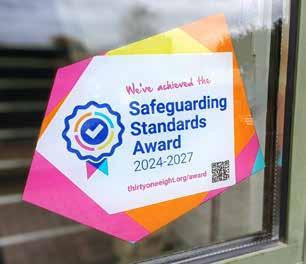
‘THE AWARD PROCESS HAS BEEN SMOOTH, INSIGHTFUL AND REVEALING. IT’S INCREDIBLY THOROUGH – BUT AT THE SAME TIME REALLY ENJOYABLE. VERY PROUD OF THE ENTIRE TEAM FOR ACHIEVING IT.’ Kidscape, Award recipient.
Written by Scot McKnight and Laura Barringer


We rightfully long for cultures of goodness (we call this ‘tov’). We long to form tov cultures, to participate in them, to be transformed by them.
To form, or transform, a culture towards tov, we will want to understand the culture our church or organisation has now. If our culture is toxic, it can become systemically corrupt and then corrupt the people within it. Abusive habits will be reinforced and repeated. But if our reinforcing culture is tov and redemptive and healing, it will instinctively heal and redeem and restore. It will reciprocate goodness and form people who embody goodness.
Tov is the Hebrew word for good or goodness. God is good, all that God creates is good, all creation has a tov design, and all humans are called by God to do good. Jesus embodies goodness, and one aspect of the fruit of the Spirit is goodness. The gospel itself is good (tov) news.
Every church is a culture. Every organisation is a culture. Culture is your church. It is your ministry, it is your organisation. And this culture you inhabit shapes how you behave, how you think, how you judge what is right and what is wrong. Culture actually socialises us into being a person who fits in that culture. We learn what is acceptable within a culture, we practice those acceptable behaviours ourselves, and we instinctively pass them to others. We form the culture but it forms us, too.
Culture is so overwhelmingly influential that leading culture commentator and New York Times columnist David Brooks says, “Never underestimate the power of the environment you work in to gradually transform who you are.”1 Think of culture as an invisible but very influential person working behind the scenes to form you into a person who fits. Such a deeply rooted culture is both reinforcing and almost irresistible.
After the publication of our first book, A Church Called Tov, my father and I were asked two frequent questions: Pastors, elders, lay leaders, abuse survivors, Christian nonprofit boards all wanted to know: How do we form a tov culture? And, they then asked, ‘How do we transform a toxic one?’ They didn’t just want to know what a tov culture looked like. They wanted to know how to form or transform a culture that had gone astray.
Formation and transformation became the guiding topics of our next season, and we learned this above all: a tov culture begins (or ends) with the character of its leaders.
The Bible adds an element that is vital to our understanding of culture formation. Culture emerges from the character of the people who shape it. We’ll be very clear here by defining Christian integrity or character: One’s basic personality, shaped or unshaped over time by virtue or vice, resulting in consistent moral traits exhibited by that person.2
We should prayerfully evaluate our churches and ministries, asking these questions: Does our ministry prioritise character formation? Or, does it place a higher value on performance and skill? Character matters more than culture. Character matters more than skill and strategy and power. Character determines the very substance of where a culture is headed.
Character formation should be central to culture formation and transformation, but transformation agents often want to know where to begin. Here’s our suggestion, developed more completely in our new book, Pivot: We must challenge our Christian workplaces and churches to live out the prophet’s vision in Micah 6:8 (justice, kindness, humility), to live out the Sermon on the Mount’s description of kingdom life, to live out Paul’s vision of life in the Spirit, and to live out the love-infused life described by John in 1 John. Start there – start with love, godliness, justice, Spirit surrender, and tov as foundations for character formation. Each of these complements and suffuses the other.
It will take power and influence to provide space for character formation like this to flourish, but only power that flows out of a tov character will trend towards goodness. So let’s talk about power.
Power, as we use it in our work, is the capacity to influence people, including empowering others to do what they need to do to influence others. That capacity may be God-given or it may be seized by someone hungry for it. Power may be derived from position or skill or money. Something gives a person the capacity to influence others and shape a culture. Power can be power to, power over others, or it can be power with others and for the good of others. All people have power. Power is within all of us – in our mind, heart, and will. We have power because we are made in God’s image and are empowered by God to be agents of influence. Our character shapes the directions of our use of power. Pastors, leaders of Christian organisations, and ministry boards all have power, too, and hold tremendous influence over culture. How these charactershaped leaders use power indicates whether their culture becomes tov or toxic. I’ll go one step further and add this: how a leader uses her power reveals her character. Though power can be dangerous, it is not inherently evil. It can be a force for goodness (tov) if tov people are the ones exercising it.
In the months after A Church Called Tov’s publication, my father and I also received continuous stories from people who experienced, and suffered from, power abuse in a church. We heard stories of coercive and controlling uses of power wielded by church leadership, which is spiritual abuse. We received so many letters and had so many conversations, in fact, that we are convinced the assessment of power dynamics is essential to monitoring culture. We are also convinced that the biggest issue in toxic cultures is abuse of power as a result of toxic character.
But remember, power is a force for goodness if a tov character is the one exercising it. The radical theory of power taught by Jesus was to share it, to use it for others, to empower others, and to liberate. For Jesus power was about power with and power for, not power over.
For real transformation to happen, influencers must be people of tov character who use tov power to shape their culture into one of goodness. The single most important practice in building and transforming a tov culture is a Christlike exercise of power.
The transformation of Oak Hills Church is a beautiful example of power properly used.
Mike Lueken and Kent Carlson were co-pastors of Oak Hills Church in Folsom, California. Founded in the 1980s. Oak Hills was a successful, attractional megachurch with exploding attendance. Lueken and Carlson called the growth exhilarating and intoxicating and they liked the attention and being known as up-andcoming leaders.
But these pastors felt increasingly uneasy and mentioned their “runaway ambition” and described services like they were “feeding a monster.” They’d put on weekend services and then realise the congregation – who had become consumers – wanted an even better performance for the next weekend. Their culture, they reflected, was fed by attraction and consumerism and numbers and ambition.
The two pastors listened to the stirring of the Spirit in their souls and wrote in their book Renovation of the Church, “We found ourselves in an almost constant state of disequilibrium…
We began to realise that our current church structure was actually working against the invitation of Christ to experience his authentic transformation.”3
The church leaders decided to stop counting how many people were coming to the church and instead focus on who those people were becoming. They discipled the congregation and steadily pushed against consumerism in the culture. The pastors surrendered to the Spirit, followed the Spirit and let God do the work of transformation in their lives and in the culture of the church.
It was tov and it was transformation. And above all, it was the result of depending on God’s grace.
Any discussion of building tov cultures must include the beautiful mystery of God’s grace. After all, genuine transformation towards tov requires the grace of God because it is the Spirit’s work in drawing us to repentance and transforming us. Grace transforms and transcends and I quote my own father here from his book A Fellowship of Differents: Grace turns Spirit-resisters into Spirit-listeners.4
If we are to transform our cultures, it will not be (only) because we are talented or intelligent or good at developing and monitoring systems, however much they may contribute. Nor will it be because we hired attractional, magnetic personalities or found talented staff, though such giftedness contributes. No. The deep, deep work of transformation and creation of tov cultures is the work and the grace of God. It is Spiritlisteners collaborating with God toward tov. It is his work into which we are invited.
1 David Brooks, The Second Mountain: The Quest for a Moral Life (New York: Random House, 2019), 22. Italics mine
2 Scot McKnight and Laura Barringer, Pivot: The Priorities, Practices, and Powers Than Can Transform Your Church into a Tov Culture. (Carol Stream, IL: Tyndale House Publishers, 2023), 38.
3 Kent Carlson and Mike Lueken, Renovation of the Church: What Happens When a Seeker Church Discovers Spiritual Formation (Downers Grove, IL: IVP Books, 2011), 20.
4 Scot McKnight, A Fellowship of Differents: Showing the World God’s Design for Life Together (Grand Rapids, MI: Zondervan, 2016), 38-39.
Written by Rachel Newman

There can be a tendency to think that a healthy culture is a happy culture; and that somehow smiles are a measure of health.
Sometimes, however, the opposite is true. It’s not the seemingly happiest cultures that are the healthiest – it’s the most honest.
We see it on social media every day, don’t we? The most polished and perfected images of a smiling clan are not a reliable signifier of the health of a family and its dynamics. I seem to spend an inordinate amount of time trying to get the best shots of my little boy – but the best are those which are unashamedly honest – his inquisitiveness over a snail or thoughtful observation of his Playmobil pyramid. The honesty of these pictures, more than the ones of cheesy grins that I can sometimes elicit with chocolate-related bribery are somehow more precious to me, because they reflect the truth of a moment in time.
Healthy cultures are ones which, like the almost four thousand photos of my son on my phone(!), can recognise the full spectrum of human emotions. That isn’t to say that all these emotions are to be expressed all the time, but that we recognise that every person we are working with or serving alongside is going to be experiencing different situations. This is particularly pertinent when we’re facing the complexities and emotional intricacies that safeguarding can evoke.
So how can we healthily manage our emotions – especially in what feels like increasingly difficult times?
There is perhaps no singular answer, but there is a practice that can enable us to process our emotions whilst bringing them to God in prayer –and that is through lament.
Put simply, lament is bringing what hurts before God. It’s seen throughout scripture from the cries of the Israelites in their forty years in the wilderness, to Jonah in the belly of the whale, the book of Lamentations, throughout the life of Jesus and those in the early church like Peter and Paul.
Despite its prevalence in scripture; there is still a little reticence for churches and organisations to practice lament. For some, this is a fear that lament is somehow a lack of gratitude, yet we see in the Bible that lament and gratitude often go hand in hand.
Indeed perhaps the most famous verses in the book of Lamentations are where we read in chapter 3:19-22:
“I REMEMBER MY AFFLICTION AND MY WANDERING, THE BITTERNESS AND THE GALL.
I WELL REMEMBER THEM, AND MY SOUL IS DOWNCAST WITHIN ME.
YET THIS I CALL TO MIND AND THEREFORE I HAVE HOPE:
BECAUSE OF THE LORD’S GREAT LOVE WE ARE NOT CONSUMED, FOR HIS COMPASSIONS NEVER FAIL.”
In the entirety of the book up until this point, we have seen a litany of pain and objections put to God, both for the writer personally and more broadly for the people of Israel as the author reflects on the pain of the destruction of Jerusalem and subsequent exile in Babylon. And yet here, right in the centre of the book there is a turning point where the writer is able, after expressing his complaints, to look back to God and be thankful for God’s love and compassion alongside the pain they’re expressing.
The turning point from lament to praise rests not on a change of circumstances; but on the character of God and the love he has for his people.
The other blockage to lament is often in knowing how it works in our places of work and worship; because it is more than complaint (I expect most of us are well practised in complaining in whatever our setting!) it brings our troubles and difficulties before our all-loving, all-knowing and all-powerful God.
In light of this, there are ways that we can lament together and find that it is a way that we can more deeply experience the joy of the Lord as we honestly reflect on what hurts.
Honesty is at the core of practising lament; it refuses to sugarcoat life’s difficulties but also refuses to surrender the hope we have in Jesus Christ.
The first has probably become evident as you’ve read, and that is to ensure that honesty is at the heart of your values; not just intellectually – but spiritually and emotionally. This means encouraging people to answer the question “How are you?” with something more than “I’m fine”. The organisation ‘Time to Change’ ran a campaign some years ago encouraging people to “ask twice” to move the conversations from superficiality to honesty. This can be a useful tool, especially during 1-2-1s or line management meetings, but remember that it’s not a manager’s role to solve everyone’s problems – but to support them.

The second is to utilise the Christian year and seasons of the calendar to experience the spectrum of emotions together. This could be done on an Away Day, weekly reflections or by marking the big seasons such as Christmas and Easter but ensuring also to include Advent and Lament to get the emotional and spiritual breadth of the season. It includes recognising the lean, autumnal times of life or the times of emptiness that might be the winters of our lives – as well as celebrating times of new life that are reflected in spring. Whilst the seasons move easily, we have to recognise that people’s emotions won’t fit neatly into the seasons, especially those navigating the aftermath of abuse.
The third is finding ways to come together to express these feelings; for some, it might be having a shared Spotify playlist that everyone can access on difficult days filled with a mix of songs that reflect sadness but also ones that reorientate us (I particularly recommend
the Sanctuary Songs album) music is a great leveller and often allows us to say things we can’t verbalise in other ways, which is shown in the largest collections of laments found in the book of Psalms. You might also consider holding a “Blue” Christmas reflection to make space for lament within the sparkle of the season and recognise its emotional complexity.
Ultimately, having a healthy culture is about learning to follow the maxim set out in Paul’s letter to the Roman church (12:15) to “Rejoice with those who rejoice and mourn with those who mourn.” It allows individuals, organisations and communities to come together honestly to express our emotions to one another and God. Learning to celebrate together and grieve together allows us to grow and flourish through the hard and the happy times.
Rachael Newham is a Theology of Mental Health Specialist and author of “Learning to Breathe” and “And Yet” – you can find her on social media @RachaelNewham90
























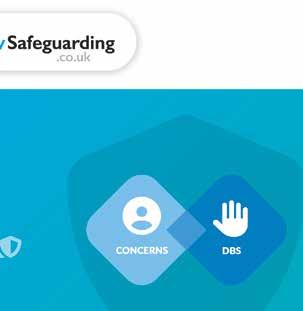




Written by Kate Sharma, Cinnamon Network
Ihave a confession. Not so very long ago, I found myself asking, ‘does safeguarding even apply to us?’ Now I think it’s the bedrock of absolutely everything we do at Cinnamon Network. Let me explain.
Here at Cinnamon, we’re a small bunch of folks located in the far-flung corners of the UK. We resource the UK Church to transform their communities by working with leaders of grassroots projects and larger Christian charities. Basically, we provide funding, training, resources and bring together brilliant people to support each other.
We don’t have an office. Most training is conducted online. Oh, and we’re not working directly with young people, or anyone typically considered ‘vulnerable’. It would be easy for us to bemoan our limited scope of influence and abdicate all responsibility for safeguarding.
But COVID made us think again, when it blew the doors off normality.
More and more people attended our webinars and training events. Requests for funding went through the roof. And funders were asking for our help in administering grants. Underlying everything, was the dawning realisation of our collective vulnerability.
It was perhaps a painful wake-up call we all needed. But for an organisation, a little removed from the front-line work, it’s taken us a while to work out what our responsibilities and accountability are, when it comes to safeguarding.

With little front-line exposure, our scope of influence is limited. However, no matter how limited our influence is – we have a responsibility to use it. For the team at Cinnamon, it all began with an open conversation to define exactly who we are responsible for and who we are accountable to.
Of course, we’re responsible for our own teams and for the individuals we interact with online and in person. When it comes to accountability – we have a responsibility to our funders, our partners and the wider range of organisations who trust our judgement and look to us for guidance.
When it comes to supporting those we are responsible for – we’ve found open conversation to be one of the most effective ways to keep our skills sharp.
Safeguarding is a little bit like a muscle that needs to be exercised. But that can be tricky if you’re not encountering disclosures regularly. This is where your friends come in!
As we’ve mentioned – we work with a whole range of churches and organisations who are engaged in frontline community work. Last year, with the help of the team at Thirtyone:eight, we ran two webinars and an additional session for the Cinnamon Recommended Projects we partner with.
We looked at best practice frameworks and how to implement them. But the richness of the sessions was in lived experiences brought by each individual, church and organisation who took part in the discussion.
Conversations quickly ventured into what you do when the urgency of a situation means protocols are thrown out of the window. Or how to have those challenging conversations, without judgment or fear. Or when to trust your gut instinct.
It was refreshing and invigorating – words I never thought I would use in conjunction with the topic of safeguarding.
When it comes to our accountability – we’ve gained greater confidence in challenging those we work with, asking difficult questions and being prepared to say ‘no’.
We love the way that God works through the least, the last and the most unlikely. But we’re no fools. We’re accountable to those who fund us, and, more importantly to God. Checking that our partners have their safeguarding in place and DBS checks up to date is not pedantic or bureaucratic. It’s just the right thing to do. We’re not looking to catch anyone out but rather to underscore how integral safeguarding is to everything we do as an organisation. It’s a conversation we make sure is upfront and central, not an add on or tick box at the end of a form.
As a sector we need to work together to hold each other accountable and use our experience to navigate the tough stuff. So, when we’re faced with questions we can’t answer or find an organisation that just needs a little more guidance – we get in touch with our friends at thirtyone:eight.
As Christian organisations, we serve the same God and therefore have a collective responsibility. Safeguarding failings, shortcomings and blatant crimes of any church or Christian organisation are a punch in the gut for all of us. When one of us fails – we all fail.
As we’ve seen, safeguarding isn’t just for those on the front lines – it’s a responsibility we all share, regardless of our position or perceived influence. At Cinnamon Network, we’ve learned that:
1. Limited influence is still influence
2. Open conversations strengthen our safeguarding muscles.
3. Be prepared to hold each other accountable. Ultimately, safeguarding is not about ticking boxes or filing away policies. It’s about creating a culture of safety, trust, and accountability that permeates everything we do. As Christian organisations, we have a higher calling – to protect the vulnerable, uphold integrity, and reflect God’s love in all our actions.
As cheesy as it sounds, when we prioritise safeguarding, we’re not just protecting individuals – we’re strengthening the entire body of Christ and our witness to the world. It’s time for all of us to step up, ask the tough questions, and hold ourselves and each other to the highest standards. Because in safeguarding, as in faith, we truly are stronger together.
Kate Sharma works for Cinnamon Network, an organisation that resources the UK Church for social action. They do this by investing in and developing leaders of church and Christian social action projects and by providing practical advice and resources to help those leading community work at a grassroots level. cinnamonnetwork.co.uk

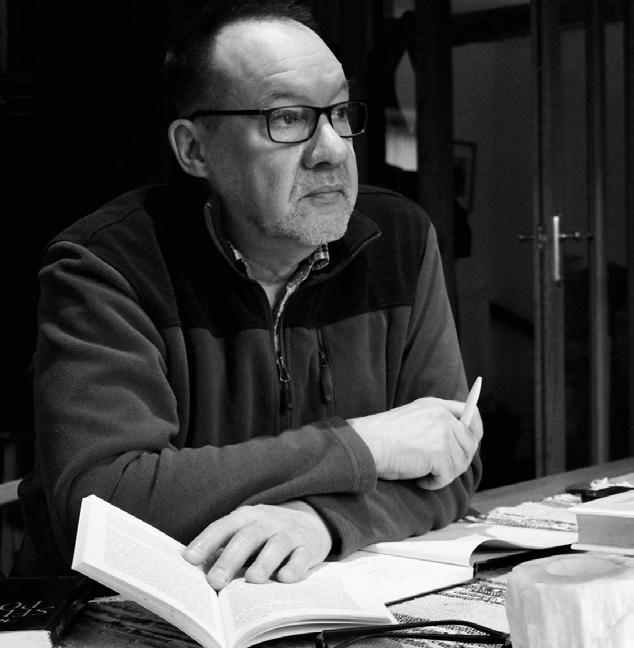
While there are many examples of healthy cultures in churches working to become safer places, unfortunately, there are also examples where the church has failed to protect its members, resulting in lasting harm.
It’s impossible to explore healthy cultures without considering the perspective of
congregations may be more inclined to support these leaders despite any misconduct. This is often due to coercion or collective cognitive dissonance. It’s this latter culture where we need to focus efforts for change.
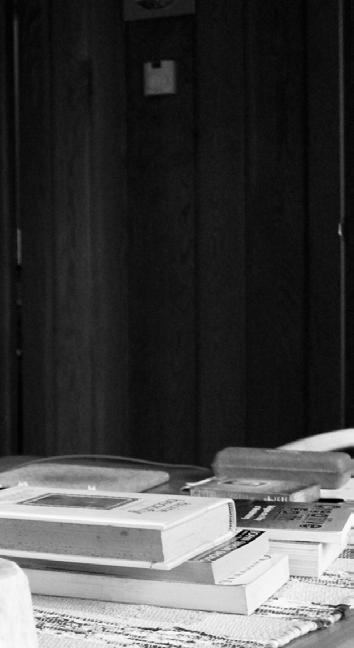
Churches especially at risk are those that lack wider structural accountability. Sometimes parachurches although part of a wider structure can operate as a law unto themselves. One of the stories that surprised me was the Soul Survivor emergence. It illustrates how abuse can persist for years, even amid extensive media coverage and inquiries like IICSA. Similar stories likely exist in churches where unchecked leaders wield considerable influence and power. Justin Welby praised "powerful leaders" at Synod, I would urge caution though, powerful leaders require powerful checks and balances to ensure such individuals are held accountable.
One Bishop of the Church of England asked me recently what I thought were the three biggest obstacles to change. Among my responses, I said that the greatest obstacle is transparency. Church leaders need to strive for transparency in all things, especially in safeguarding issues and responses to survivors. Be transparent about processes and keep people informed as to what you are doing, why you are doing it, how you are doing it and who is doing it. Transparency needs to be forthcoming, not months or years down the line. Delays often result from embarrassment or pressure to reveal failures, but delayed transparency is not transparency.
In the Church of England many dioceses have made huge strides and now respond very much better than ten years ago, the challenge is how to bring the improved culture at a grassroots level into the senior management.
Victims and survivors need communities that are informed, supportive, and proactive in safeguarding. As a priority, in my opinion, it’s crucial that all institutions, especially Churches, engage directly with the Home Office and convince the new government to introduce a well-designed Mandatory Reporting law. The law must include suspected abuse. Once in place, my feeling is that culture change will happen across institutions in a weekend! Many of the current policy sets will become redundant.
Safeguarding at local level should be as easy as possible. In the same way that the instruction to report suspicious packages left unattended on the Underground is straightforward. I believe that safeguarding on the ground really shouldn’t be complicated. Sure, those with professional responsibility and in dedicated roles have access to files and policies that the public don’t – but fundamentally safeguarding should be the responsibility of everyone in church communities. And should be simple. If in doubt – report. If you suspect – report. If you observe behaviour that you instinctively know is off – report. And all church communities should have a clear reporting structure and dedicated safeguarding officer.
One vital area in which local churches could support victims/survivors is through their widespread willingness to engage with the experiences and wisdom of survivors. I would encourage as many as possible to read the key books that we list on the House of Survivors website (houseofsurvivors.org/category/ books/) such as Letters to a Broken Church, To Heal and Not to Harm, Bleeding for Jesus, Escaping the Maze of Spiritual Abuse and Sex Power Control. All these and other books contain a bandwidth of survivor experiences across different traditions. And I think plenty more books will be published in the coming decade looking at particular stories and how they were able to pass under the radar for so long.
One parish remarkably bought 100 copies of our book (Letters to a Broken Church) to distribute freely. The more people who know what has happened in their churches, the stronger the clamour for accountability and change will be.
The worldwide church will still be facing the aftermath of this crisis for years to come. I hope it will show itself capable of the compassion required. Moving forward, churches must continue supporting survivors, recognising the long-term emotional and financial needs resulting from decades of denial and cover-up. A cost previously borne by survivors that must now be met by the churches.
By fostering healthy cultures of transparency, accountability, and proactive safeguarding, churches can become safer, more supportive spaces for survivors of abuse. The journey towards healing and reform requires collective effort and unwavering commitment to change.
For more resources and recommended readings, visit houseofsurvivors.org/category/books/
Written by Karen Eakins, Head of Safeguarding, Thirtyone:eight
‘REFLECTING ON WHY WE EXIST, OUR VALUES, WHAT PEOPLE ARE SAYING ABOUT US, WHAT ARE WE SEEKING TO CULTIVATE. THESE ARE ALL KEY QUESTIONS THAT AID BOTH OUR REVIEWING AND SETTING OF A HEALTHY CULTURE.’
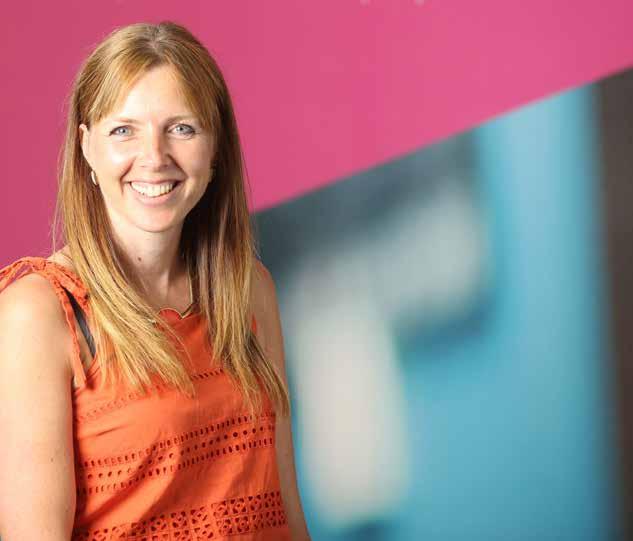
Culture is a foundational part of our organisation and how we operate. It reflects our values, our story, our beliefs, our purpose. But culture isn’t a static thing, it shifts as we experience changes in our contexts and our understanding.
For example, when I travelled to Uganda a few years ago, my son and I got into a taxi to our hostel. After 12 hours of travelling with 3 young children, we had just landed in an unknown country to me. I quickly realised the taxi had no seatbelts. None of the taxis had seatbelts! We had a choice, we either take this taxi, and I compromise my standards…or we take a long walk! In that moment I had to adapt my usual practice in light of the context, circumstances and culture I was in.
I wonder how conscious we are of how our cultures change and our attitudes shift. Our behaviour and thoughts will be shaped by the culture we are immersed in. And that’s why we must take moments to pause and reflect on our culture, and its impact on our people and our practices. We need to ask ourselves, ‘Is the culture we have the culture we want?’ And ‘what impact is the culture having on our people and our mission?’
Culture setting is an intentional activity that requires consideration. In social work, we emphasise the importance of reflective practice. It allows you to capture and appreciate positive experiences and identify additional ways to improve how and what you’re doing. It can also be useful when you’ve experienced challenging situations, whether within your team or through the feedback you receive, to pause and harness the learning that will ultimately strengthen you and your organisation going forward.
Sometimes reviewing our own culture can be challenging, we don’t always know what we don’t know. ‘The boiling frog’ is a brief fable (origin unknown) that illustrates that if a frog is put suddenly into hot water, it will jump out, but if the frog is put in tepid water which is then brought slowly to a boil, it will not notice the danger and will die. The story is often used as a metaphor for the inability or unwillingness of people to react to or be aware of threats (including abuse) that arise gradually rather than suddenly. We too, can adapt to the culture we’re in and get comfortable as we are submerged in it.
Reflecting on why we exist, our values, what people are saying about us, what are we seeking to cultivate. These are all key questions that aid both our reviewing and setting of a healthy culture.
At Thirtyone:eight we take this seriously. We believe a healthy culture is a safer culture. If you’re serious about creating and maintaining a healthy culture, there are things you can do. However, you may feel like the fable of the frog, that you are so submerged in the culture, that it is hard to do a temperature check, as you are so intrinsically part of it.
We have developed a couple of resources that can assist you and your team review the culture within your organisation. We believe so much in the value of this, that we have been using this across our leadership team to help us review our practice and service, and identify any way we might improve our culture. We hope that these tools might be useful for you too.
The first resource is our Culture Cube. Based on the six components of a safer, healthier culture outlined in the book ‘Escaping the Maze of Spiritual Abuse: Creating healthy Christian cultures’ by Lisa Oakley and Justin Humphreys:
1. Communicate well
2. Listen well
3. Manage power
4. Establish good governance
5. Build effective structures
6. Model safe behaviours
Each side of the cube represents one of the key components and gives you prompts to have conversations about the culture of your organisation.
The cube will help your team to take an inquisitive approach to both the internal and external experience of your organisation, enabling you to understand what others experience and say about their experiences with you.
For leaders who feel like the frog in increasingly warm water, we can offer additional support. Our culture audit tool offers you an independent and non-judgemental review of your organisation’s culture. Following the review, we will provide feedback, with insights and recommendations.
An audit could sound intimidating, but our reviewers come with a spirit of curiosity. We’re there to support you. The audit is more of an exploration of your culture, using the same six components of safer, healthier cultures as the culture cube. Our expert reviewers will talk to you, get feedback from your staff and volunteers and take a look at key documentation. The feedback we get from people’s experiences helps us explore where there is evidence of healthy practice and behaviour, as well as where there may be a need for review and change.
The benefit of an external audit is that people sometimes find it easier to speak openly to people outside the organisation, meaning you get an accurate picture of people’s experiences. We will pull together voices, experiences and observations that are honest. This stops culture from being an assumed existence and gives you something real when considering your next steps.
The process will likely bring some surprises. When we are part of the culture there are things that we just don’t see. Not because we are intentionally blind to them, but because, like the frog, we are submerged in them. Thirtyone:eight, however, is about ‘creating safer places together’. Our intention is to walk with you through this process of discovery and transition with sensitivity and care. Therefore, you can expect that we will be supportive through the process and empower you with manageable solutions for the future.
Too often abuse and harm happens in organisations who have neglected to review their culture, and yet, with some honest reflection and intentional effort, our cultures could be places where people and mission thrive. Writer and speaker Wendy Mann, in her book ‘Leading as Sons and Daughters’ writes,
‘CULTURE IS KEY WHEN IT COMES TO CREATING A SPACIOUS PLACE FOR THE PEOPLE WE LEAD TO FLOURISH. IT IS POSSIBLE TO INTENTIONALLY CREATE AN ENVIRONMENT THAT REMOVES BARRIERS AND BLOCKAGES TO PEOPLE’S GROWTH AND INSTEAD FACILITATES AND MULTIPLIES FRUIT.’
So how will you intentionally create a healthy culture that bears much fruit?

1 Wendy Mann, Leading as sons and daughters: Discovering the joy of empowering others. (Malcolm Down publishing, 2019) p.61. Find out more about our culture audit and consultancy services on our website thirtyoneeight.org You can buy a culture cube here: thirtyoneeight.org/shop
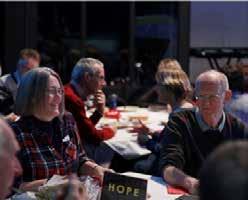
Written by Julie Wilson and Kintsugi Hope
In 2018, when our charity was newly established, we sought the expertise of Thirtyone:eight due to their outstanding reputation in providing reliable advice and guidance on safeguarding matters. We needed assistance in crafting our safeguarding policy and obtaining advice on what to request from our partners to ensure robust safeguarding oversight.
We recognised gaps in our knowledge, awareness, and training concerning safeguarding. Specifically, we needed clarity on our safeguarding requirements, particularly from our partners and group leaders. Additionally, we needed guidance on how to gather information effectively as a third party to ensure safeguarding remained a priority in our wellbeing groups. Thirtyone:eight’s safeguarding policy template proved invaluable, and their training significantly enhanced our staff’s understanding of safeguarding practices.
One of our biggest challenges has been understanding and ensuring optimal safeguarding practices across various locations, cities, and churches. Additionally, comprehending the different safeguarding requirements and practices in England, Wales, Northern Ireland, and Scotland has been a complex task.
Thirtyone;eight supported us by helping establish a system and process that placed safeguarding responsibility on our partners while guiding them towards best practices. Their support included providing a dedicated person to address our safeguarding queries and helping us understand the varying safeguarding requirements across different regions. This support has been crucial in managing the safeguarding of our wellbeing groups effectively.
A key safeguarding need for organisations like ours is ensuring everyone is aware of best practices and understands how to implement them. This includes routine procedures such as DBS checks for staff and regular safeguarding training.
WE WOULD DEFINITELY RECOMMEND THIRTYONE:EIGHT TO OTHER ORGANISATIONS. THEY HAVE BEEN INSTRUMENTAL IN HELPING US NAVIGATE THE COMPLEXITIES OF SAFEGUARDING, SETTING UP NECESSARY SYSTEMS AND PROCESSES, AND OFFERING VALUABLE OPPORTUNITIES FOR ONGOING TRAINING AND REFRESHERS.
Kintsugi Hope is a charity based in the UK striving to make a difference to peoples mental wellbeing. They want to see a world where mental and emotional health is understood and accepted, with safe and supportive communities for everyone to grow and flourish.
“Kintsugi” (金継ぎ) is a Japanese technique for repairing pottery with seams of gold. The word means ‘golden joinery’ in Japanese. This repairs the brokenness in a way that makes the object more beautiful, and even more unique than it was prior to being broken. Instead of hiding the scars it makes a feature of them.
Find out more at kintsugihope.com


Boost your credibility, motivate your team and assure the highest level of protection for those you serve.
“The Safeguarding Standards Award allowed us to demonstrate our commitment to this vital area.”
Riverside AOG church, 2023 Award recipient. Scan here or visit
Written by Paula Pridham, Director, Care for the Family


Care for the Family was founded by author and speaker Rob Parsons, OBE in 1988, with a mission to support family life in the good times, but also to help those who face family difficulties.
Our focus is primarily parenting, marriage, and bereavement. Our content is accessible, preventative, evidence-based and easy to apply. Our audience is “the many and the few,” offering support to all faiths or none. Our delivery is in person, online and in print by producing relevant, quality services and resources. With 80 staff and almost 200 volunteers, we work across the UK engaging, in many ways, with tens of thousands of people each year.
We have deep-rooted core values which are to be vulnerable, generous in spirit and seek to honour everyone, especially those who may be seen by others as the least. Our motivation is compassion and a desire to express God’s love to all people – regardless of whether they share our faith or not. This combination impacts how we develop and deliver services to those who come to us for support. It also guides us in nurturing an environment where employees feel valued, supported, and motivated. Values and culture are integral to the organisation in making it a safe place not just to work, but for families to find the help they need.
After Covid we felt it important to emphasise our values to the staff team, many of whom
were new. We want our values to be part of the everyday life of the organisation. We talk about them as we recruit, at staff conferences and in annual reviews, unpacking how they should look in practice with real-life examples. This feedback, along with survey responses and correspondence we receive from our beneficiaries, is invaluable. It provides a way to assess how well we are doing, and course correct if needed.
But then there are unwritten aspects of our culture, more about how we approach things. This includes things like fun, good personal relationships, being welcoming and keeping short accounts.
Many people have said that we have been a safe place for them, and that is something we want to maintain. Emotional, mental, and spiritual safety is as important to us as physical safety, especially when we have vulnerability as one of our values. It is also a value we pass on to those who train with us to deliver our parenting courses. Many come from churches who want to use our materials for outreach. We also have attendees from local authorities, and more recently chaplaincy within prisons. During the training, we cover safeguarding as a topic, relating to the legal framework, but our trainers also model it.
One of the important topics covered is selfdisclosure. We believe there is great power in facilitators being fellow travellers – albeit with experience and knowledge – rather than the ‘expert’ in the room. We show how we can do this by sharing our own experiences, positive and negative ones. A danger is that it can be all too easy to over-share, saying something you later regret. We work on how you can set boundaries to your vulnerability, whilst still being authentic. This includes things like not using a story involving others without their permission, particularly when in it includes your own children. Being clear for yourself on how much personal information you are prepared to share and not feeling obliged to say more. How, if asked a personal question, you do not have to answer it –some things can remain private.
There are other aspects of our provision where more formal safeguarding comes into play. This is where Thirtyone:eight are particularly helpful for us. Much of our work is with vulnerable people who access our counselling referral service, ask for a befriender or come on one of our Take a Break holidays for single parents. We have confidence knowing that if any issues come and we need additional wisdom and advice, we can just call them. The objectivity, up-todate knowledge, and confidentiality they offer is vital, particularly if you are in the middle of a demanding situation. We trust them to steer us in the right direction and they provide a source of accountability for what we do.
For any organisation working with people, it so important that you can be trusted. Trusted to look after them, to not abuse them or take advantage of them. That holds true whether it is those who work for you or your beneficiaries. There are legal requirements to have policies in place for safeguarding, for example DBS checks for staff and volunteers as appropriate, but really that is the bare minimum that we need. It is by embedding what those policies represent into our values and culture that leads to good practice. It involves nurturing an environment where everyone feels valued, supported, and motivated.
CREATING A HEALTHY CULTURE IS ESSENTIAL FOR EVERYONE’S WELL-BEING, PRODUCTIVITY, AND OVERALL SUCCESS OF THE ORGANISATION.
THIRTYONE:EIGHT CAN HELP ANYONE TO DELIVER THAT.
Established in 1988, Care for the Family is a charity based in the UK, but with an increasing reach internationally. We support parents, couples and those who are bereaved, through events, courses, podcasts, volunteer befrienders, books and other evidence-based, accessible resources. Find out more at cff.org.uk







